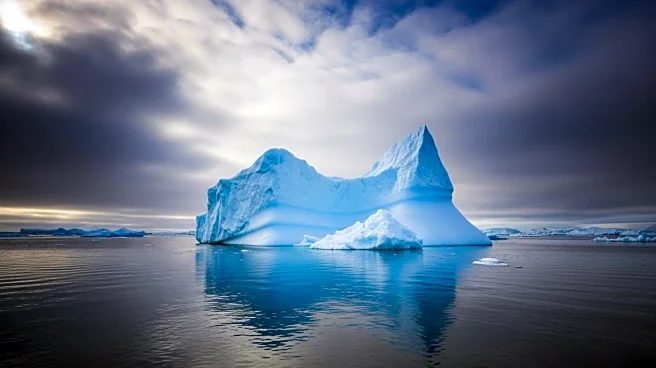What is the story about?
What's Happening?
A group of scientists has dismissed proposals for polar geoengineering as 'unimaginably expensive' and 'dangerous.' These proposals include methods like scattering glass beads across ice and using underwater curtains to combat climate change effects at the poles. The analysis, published in Frontiers in Science, argues that these schemes are flawed and divert attention from the root cause of climate change, which is the burning of fossil fuels. Critics of the analysis argue that it focuses only on the negative aspects of geoengineering without considering the potential benefits. The Arctic and Antarctic are warming faster than other regions, leading to ice loss and rising sea levels. The researchers emphasize that cutting emissions remains the most effective way to address climate change.
Why It's Important?
The debate over geoengineering highlights the challenges in addressing climate change. While some see geoengineering as a potential emergency measure, others argue it distracts from necessary emissions reductions. The polar regions are critical in the global climate system, and their rapid warming poses significant risks, including sea level rise and ecosystem disruption. The analysis suggests that investing in emissions cuts is more viable than geoengineering, which could have unforeseen environmental impacts. This discussion is crucial as governments and scientists seek effective strategies to mitigate climate change.
What's Next?
The analysis calls for prioritizing emissions reductions over geoengineering research. However, some researchers advocate for continued exploration of geoengineering as a potential tool in the climate crisis. The UK government has funded real-world geoengineering experiments, indicating ongoing interest in these methods. The scientific community remains divided, with calls for a balanced debate on the risks and benefits of geoengineering. Future research and policy decisions will likely focus on finding the most effective and sustainable solutions to climate change.
Beyond the Headlines
Geoengineering raises ethical and governance challenges, particularly in fragile polar environments. The potential for unintended consequences and international disputes over geoengineering efforts underscores the need for careful consideration. The debate also reflects broader tensions in climate policy, balancing immediate interventions with long-term sustainability. As climate impacts intensify, the pressure to explore all available options, including controversial ones like geoengineering, will likely increase.

















